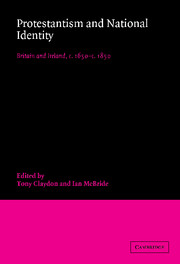Book contents
- Frontmatter
- Contents
- List of contributors
- Acknowledgements
- List of abbreviations
- Introduction
- England
- Britain and Ireland
- 6 The British dimension, religion and the shaping of political identities during the reign of Charles II.
- 7 The bible and national identity in the British Isles, c.1650–c.1750
- 8 Protestantism, presbyterianism and national identity in eighteenth-century Scottish history
- 9 Protestantism, ethnicity and Irish identities, 1660–1760
- 10 ‘The common name of Irishman’: protestantism and patriotism in eighteenth-century Ireland
- Britain, Ireland and the world
- Index
7 - The bible and national identity in the British Isles, c.1650–c.1750
Published online by Cambridge University Press: 16 October 2009
- Frontmatter
- Contents
- List of contributors
- Acknowledgements
- List of abbreviations
- Introduction
- England
- Britain and Ireland
- 6 The British dimension, religion and the shaping of political identities during the reign of Charles II.
- 7 The bible and national identity in the British Isles, c.1650–c.1750
- 8 Protestantism, presbyterianism and national identity in eighteenth-century Scottish history
- 9 Protestantism, ethnicity and Irish identities, 1660–1760
- 10 ‘The common name of Irishman’: protestantism and patriotism in eighteenth-century Ireland
- Britain, Ireland and the world
- Index
Summary
[I]t can't be reasonably doubted, but the true Old Britains, or Welch, are Descendants of Gomer. And since it has been also observ'd above, that the Germans were likely Descendants of Gomer, particularly the Cimbri, to whom the Saxons, especially the Angles were near Neighbours: hence it follows, that our Ancestors likewise, who succeeded the Old Britains in these Parts of this Isle, were descended of the same son of Japhet.
When they referred to the British church, English writers of the late seventeenth century did not mean their own church, the church of England, but rather the first Christian church ever to have been established in the British Isles. They believed that this church had been founded long before the Roman empire was converted to Christianity, and hundreds of years before St Augustine of Canterbury brought the Saxon invaders of Britain under the wing of a papacy which, they thought, had already been corrupted by that time. For these authors, primitive Celtic, British Christianity was the original fire from which the torch of true religion, that was later kept burning by so-called heretics like John Wycliffe, had been lit. This was the historical true and apostolic church which propagandists of the English reformation, like John Foxe or John Beale, had claimed justified their assertion of independence from and superiority to Rome. Thus, at the end of the seventeenth century, both Edward Stillingfieet, in his Origines Britan- nicae, and Edmund Gibson, in the new edition of William Camden's Britannia whose preparation he supervised, maintained that the Britons were converted to Christianity by St Paul.
- Type
- Chapter
- Information
- Protestantism and National IdentityBritain and Ireland, c.1650–c.1850, pp. 157 - 181Publisher: Cambridge University PressPrint publication year: 1998
- 3
- Cited by



